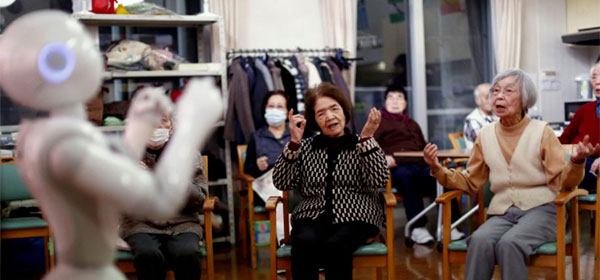What happens when there are too many old people needing care, but not enough workers to meet their needs? In one Tokyo nursing home, they use Pepper – not the seasoning, but a robot especially designed with the elderly in mind.
Built by SoftBank Robotics Corp, Pepper is programmed to speak from scripted dialogues as it guides senior residents through gentle exercise sessions.
Kazuko Yamada, an 84-year-old fan of Pepper says: “More people live alone these days, and a robot can be a conversation partner for them. It will make life more fun.”
Known as an elder-care robot, Pepper is one of 20 different of models being funded in a trial by the Japanese Government in Shin-tomi nursing home. If the program succeeds, it hopes to encourage the robotics sector to continue to develop artificial intelligence that can support carers in a population swelling with elderly people.
In 2015, almost 27 per cent of Japan’s population were aged 65 and over – in other words 34 million people. In Australia, it was closer to 15 per cent, or 3.6 million people.
The Japanese Government projects that such is the growth in senior citizens that by 2025, there will be a shortfall of 380,000 specialised carers.
Currently, only 1.7 million elderly Japanese live in aged care. The vast majority of people aged over 65 are still at home and approximately one in six lives alone. Thus the potential for artificial intelligence to be used within the wider community is huge.
Among the line-up of electronic helpers at the Shin-tomi home, there are a few whose only task is to bring a smile to the residents’ faces. There is Paro, a furry, pastel-coloured seal that responds when petted, and AIBO, a small metallic dog with a puppy-like attitude.
Then there are the more practical robots, such as Tree, an upright guide that steers those who have trouble walking and encourages them with a gentle feminine voice, and other devices that help carers lift residents from beds and move them between locations.
The Government hopes that a strong export market will develop for the Japanese-made robots. So far, Paro robots are used in 400 Danish senior citizens homes.
Would you welcome a robot helping you around the house? Do you see yourself striking up a conversation with an electronic gadget?
Related articles:
A robot suitcase
Stomach surgeon is a robot
How robots will shape retirement

